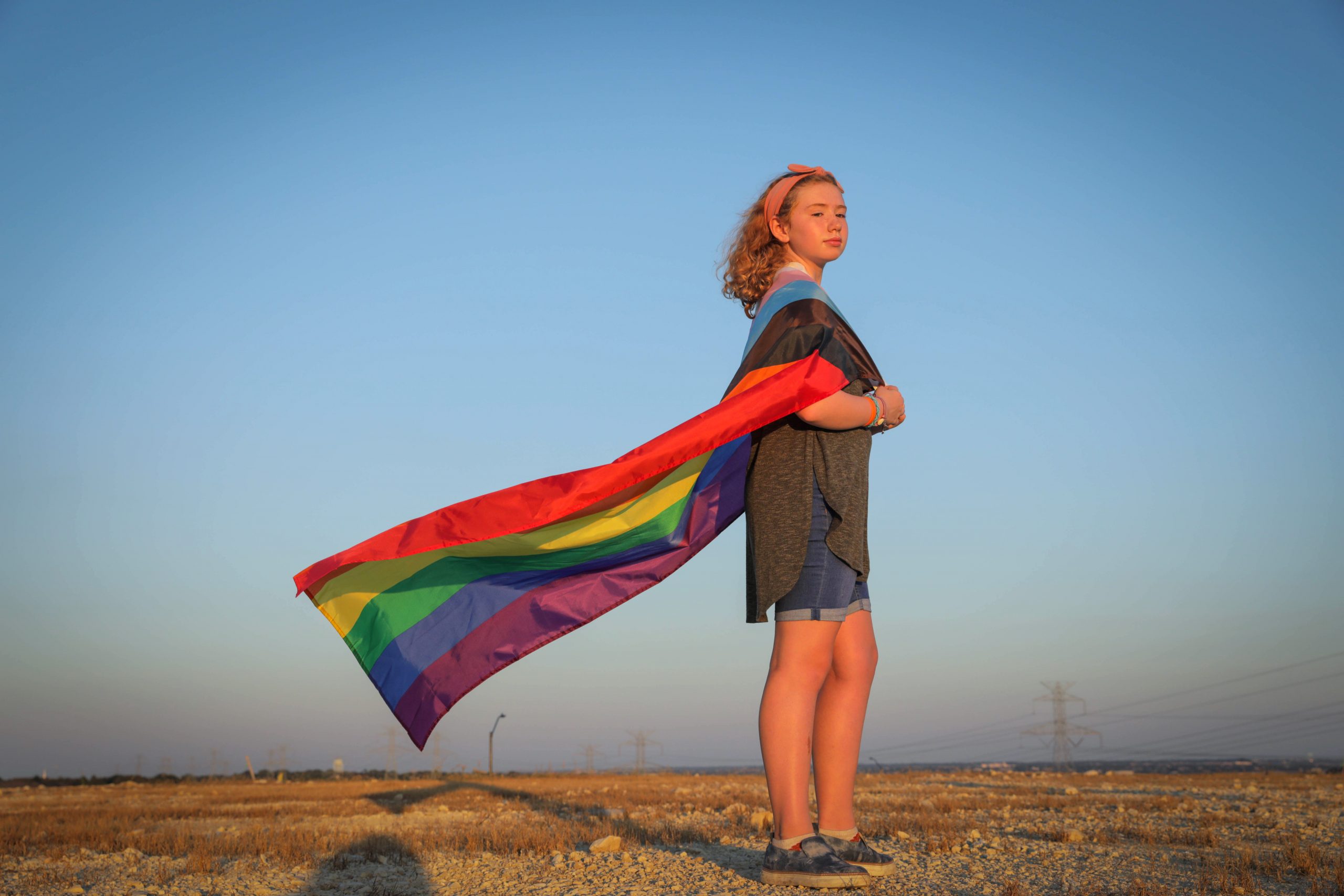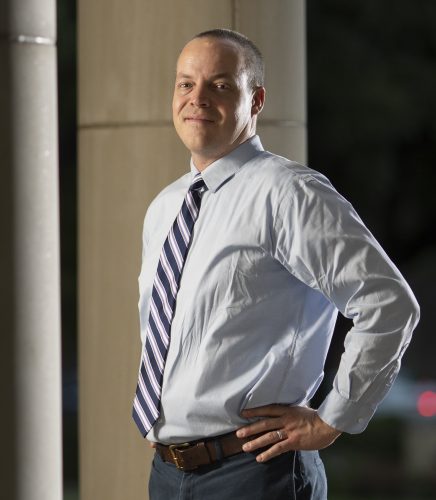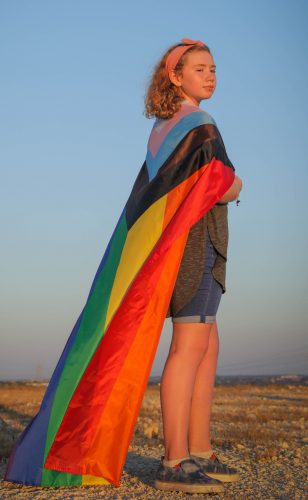Helping LGBTQ Children Come Out
Parents’ support is key when kids come out.

Photo by Amy Peterson
Helping LGBTQ Children Come Out
Parents’ support is key when kids come out.
When LGBTQ children come out to their parents, the experience is not a single revelation but a complex process. The nature of the family relationship can strongly influence how that process unfolds and affect the health of the child.
“The relationship is a third character in the story,” said Tee Tyler, assistant professor of social work.
Since 2013, Tyler has explored the development of these unique family relationships. Through meta-analysis of existing literature and interviews with queer children and their parents, Tyler has learned more about how children and parents can grow and find acceptance together.
“There are so many moving parts to this process,” he said, “and two subjective stories — one told by the child, one told by the parent.”
Tyler’s insights into these family relationships resonate far beyond the academic realm. “I want my research to benefit families,” he said. “I also want my research to inform health care providers serving LGBTQ families and health profession students preparing to work with this population.”
A Creative Conversation
After earning a master’s degree in social work in 2008, Tyler, then a new mental health therapist, needed to help a client navigate the coming-out process. “My client, a gay young man, told me he wanted to come out to his mother during their next family therapy call,” he said. “That was in one week’s time.”
“It became a constructive process of them deciding: Is this significant to our relationship? Does it matter? How will it change things?”
TCU assistant prof. Tee Tyler
Tyler scoured books and online resources for information to help him prepare for the critical call. “I didn’t feel like I found anything with a clear, evidence-based practice strategy I could use,” he said.
He felt ill-prepared when the call began.
“What surprised me was how creative the conversation was,” he said. “It became a constructive process of them deciding: Is this significant to our relationship? Does it matter? How will it change things? … That conversation opened my mind.”
That family dialogue sparked questions for Tyler about parent-queer child relationships, and the existing research in the field offered few answers. “I really became interested in how current societal and cultural views about LGBTQ identities impact a parent’s response to the child,” he said, “which ultimately impacts how they get along.”
Available research revealed that parental rejection of gay and nonbinary children is linked with health risks including depression, substance abuse and suicidal ideation. In contrast, parental acceptance serves as a protective factor, he said. “I wanted to know, ‘What do these parental responses look like?’ ”
An Ongoing Process
To find answers, Tyler conducted 11pairs of interviews, each set with an LGBTQ individual and their parent. Those 22 conversations affirmed that coming out is an ongoing process for both. In a 2020 Journal of Family Studies paper, he identified three critical relational turning points.
The first is the child’s initial disclosure to the parents, Tyler said. “It’s the gold standard of what you would assume to be a turning point.”
Tyler found that parents’ prior exposure to gay or nonbinary individuals can influence their response. “The more LGBTQ individuals that parents knew personally,” he said, “the more accepting they were.”
For example, Whitney Neumeyer Roach, a fifth-year PhD candidate in the College of Education’s curriculum studies program, was raised in the Los Angeles area and lived in neighborhoods with sizable LGBTQ populations.
So when Roach came out as a lesbian at 14, “my family knew a lot of queer people, so there was never any discussion about my identity as a queer person at that point,” she said.

Tee Tyler, assistant professor for social work, is engaged in research focused on parent-LGBTQ child relationships. He was photographed on the TCU campus (Photo by Rodger Mallison).
The second turning point is the child’s first date or romantic relationship after the disclosure. For some parents, that milestone “represented the first time that their child went public, increasing the number of people outside of the parent-child relationship who discovered the child’s LGBTQ identity,” Tyler wrote in the 2020 paper.
The third turning point represents a coming-out moment for the parents: When they become the parent of an LGBTQ child. “The parent experiences a transition in identity as well,” Tyler said. “They shift from ‘I’m accepting’ to ‘I’m now identifying publicly’ ” as a parent of an LGBTQ person.
This transition can lead to active advocacy, such as attending Pride events or pressing for LGBTQ-inclusive policies and legislation.
Richard Allen, a professor of film, television and digital media at TCU, is a strong public advocate for queer rights in support of his three children.
“Now that my children are adults and successfully navigating their own paths as proud members of the LGBTQ community,” he said, “I feel compelled to do everything I can to help make the world a safe and welcoming place for people of all backgrounds, ethnicities, and gender and sexual orientations.”
For other parents, that transition takes on the form of more reserved support. Tyler interviewed a mother of a gay son who felt compelled to speak up when her co-workers expressed support for a restaurant that opposed same-sex marriage.
“It’s not like she asked for that note in her inbox,” he said, “but it happened, so now what does she do?”
Despite feeling nervous, the woman responded to her co-workers that her son is gay and she would not patronize the restaurant.
“She didn’t know if she wanted to come out that day,” Tyler said. “But of the two options, that was the one she felt better about.”
Inherent Tensions
Not all families enjoy a relationship that allows them to navigate the coming-out process.
“My parents are both older, both baby boomers, and they have negative perceptions [of being gay],” said TCU student Zoey, who chose not to publicly share her full name.
Because of her parents’ perspective, “I didn’t straight up come out,” Zoey said. Her father doesn’t know she is a lesbian. Her mom found out accidentally and doesn’t like to talk about it, Zoey said.
“When my mom found out, she said, ‘No parent has a kid and expects them to be gay or would want that for their child.’ ”
The mother’s reaction is not uncommon.
“Your dreams of some white picket fence or whatever it was going to be doesn’t matter anything compared to your kids’ happiness.”
TCU professor Richard Allen
Tyler found that some parents struggle with the loss of previous expectations for their child, which often include heterosexual marriage and biological children.
“I completely know where that sense of loss is coming from,” Allen said. But he took a different approach with his children. “It’s not your life, but your child’s life,” he said.
“Your dreams of some white picket fence or whatever it was going to be doesn’t matter anything compared to your kids’ happiness.”
Zoey’s experience with her parents reflects a common tension that Tyler found in his research: the struggle between authenticity and acceptance. Queer children want to be true to their authentic selves while also seeking to maintain good family relationships.
Zoey self-censors her phone calls and posts on Facebook, where she communicates with family. But she is open about her personal life on other social media outlets and is an active member of Spectrum, a TCU club that provides a supportive social setting for anyone who identifies as part of the LGBTQ+ community.
“There are other Spectrum members who are completely closeted to their parents,” she said. “It’s nice because we feel like we could freely be ourselves here. But on the other hand, there has been some issues with visibility, with certain members not wanting to be in a picture for the TCU website, because there’s the feeling of, ‘What if my parents find out?’ ”
Growing Acceptance
As government policies have changed over the past decade — particularly the 2015 Supreme Court ruling that legalized same-sex marriage — younger LGBTQ individuals like Zoey are coming out and coming into their own in an atmosphere of increasing societal acceptance and awareness of queer issues.
A growing movement exists among health care professionals to develop sensitive, well-informed standards of practice for addressing the unique needs of gay and gender nonconforming individuals.

(Photo by Amy Peterson)
Modest steps, such as asking patients which pronouns they use, go a long way toward making people feel comfortable, Tyler said. “Those simple steps matter,” he said. “It’s not only about being well-versed in health care strategies for LGBTQ individuals, but also simple interpersonal skills.”
Tyler created a client simulation for undergraduate social work students at TCU to improve their ability to serve queer clients. Students conducted a 15-minute initial client interview with two actors portraying a parent and an individual who identified as transgender or bisexual.
The students reported struggling to balance the needs of both the child and parent, especially those parents who appeared hesitant to accept their children’s sexual identity. Their experiences reflect challenges faced by people in health care fields, Tyler said. “Is the health care provider effectively trained and prepared to address the parent-child pair in a manner that affirms the LGBTQ child and supports their parent? What can the provider say or do to promote long-term positive outcomes for the parent-child relationship?
“I’d like to see more focus on the relationship,” he said. “Health care providers will benefit from developing interpersonal skills to address the child, the parent and the relational bond between them. I think it could really make a difference in terms of providers becoming more supportive of LGBTQ individuals and their families.”
As for families who find themselves embarking on the coming-out process, Tyler offered some of the same advice he gives to the social work students.
“Just listen,” he said. “Pause, remain present and listen.”

Your comments are welcome
Comments
Related reading:
Features, Research + Discovery
Whitney Roach Seeks Ways to Make Schools More Inclusive for Queer Students
In K-12 schools, the researcher found little support for non-heteronormative students and families.
Features
The World is Ours
TCU’s student-designed Intercultural Center helps promote belonging.